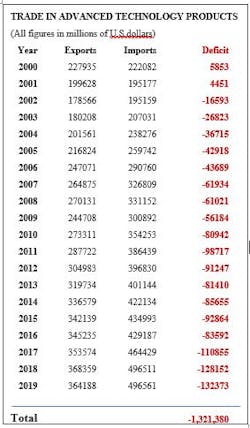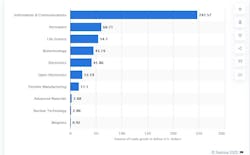Are We Losing the Technology Game?
The government has a designation for a certain collection of industries that are at the forefront of economic growth. It calls them the Advanced Technology Industries (ATIs). The sector includes 50 industries: 35 manufacturing, three energy, and 12 service industries. They range from oil and gas to aerospace, biotechnology, life sciences, opto-electronics, communication, weapons, computer systems and software. These industries also include most of the disruptive technologies, such as additive manufacturing, advanced materials, advanced robotics, big data analytics, cloud computing, the Internet of Things, and genomics.
Why Are They Important?
ATIs are very important to the American economy because they are our best shot at maintaining competitive advantage against foreign competitors—especially China. According to the Brookings Institute, ATIs perform 89% of private sector R & D, generate 80% of U.S. patents, and account for 60% of U.S. exports. These industries employ more than 12 million workers and another 27 million secondary workers, for a total of 39 million jobs. The ability to create these new technologies, particularly digital technologies, has implications for national security, economic growth, and the standard of living of most American citizens. In fact, this technological leadership is the key to economic power and remaining the largest economy in the world.
But as important as ATIs are, there are big problems emerging. America has been running trade deficits since 2002 (a total of $1.3 trillion in deficits over 18 years). In 2019, the ATI deficit was $132 billion, which is 15% of our total trade deficit. In 2002, the ATI deficit was only 4% of the total..
Source-U. S. Census Bureau- Foreign Trade -U.S. trade in goods with Advanced Technology Products
Chart B shows the volume of imports of advanced technology products in 2019. The imports in these 10 product categories totals $498 billion.
The biggest ATI deficits are in information, communication, and telecommunications (ICT), ($270 billion). President Trump issued an executive order to secure the ICT supply chain because purchasing these products from foreign countries is considered a national security risk.
There are two significant reasons for ATI deficits.
1. Outsourcing Production American manufacturers do the R&D to invent these new technologies but then move the production to foreign countries to lower their production costs. According to the Alliance For American Manufacturing, American high-tech companies that supply computers, software, routers, and printers—like Microsoft, Intel, Hewlett Packard, IBM, Dell, and Cisco—"rely on Chinese factories for an average of 51% of the components used to make their products.”
This is a problem for three reasons. First, their imports increase the deficit in advanced technology products. Second, they make American companies susceptible to cyberattacks, since they are relying on components made in China. Third, it gives Chinese companies access to American technologies.
Outsourcing production to China does increase short-term profits for American corporations. But they ignore the possibility that over the long-term, China will become a primary competitor and use these technologies to take over the market and industry.
2. IP Theft China’s primary strategy to get a hold of U.S. technology is to use joint-venture and technology-transfer agreements as a condition for companies to access Chinese markets.
China also accesses our advanced technology secrets in a wide variety of ways including: security reviews of competitive technologies; product testing for safety reasons; anti-monopoly laws; smuggling security reviews of competitive technologies, product testing for safety reasons, anti-monopoly laws, smuggling, ignoring patents, acquisition of U.S. Companies, cyber crime, reverse engineering, counterfeiting, piracy, and physical theft. In 2019 there were 24 China related arrests for espionage.
The Chinese government also funds ongoing programs to recruit operatives inside of U.S. companies to steal secrets. China has infiltrated, among many others, General Electric, Monsanto, Avago, T-Mobile, Tennessee Valley Authority , and Solar World. FBI director Christopher Wray has stated, “No country presents a broader, more severe threat to our ideas, our innovation, and our economic security than China” and “China is determined to steal its way up the economic ladder.”
Made in China 2025
At the same time as America is slipping competitively, China has launched an ambitious plan called “Made in China 2025.” Under Chairman Xi Jinping, China has been open about the fact that they intend to seek dominance in many Advanced Technology Industries. They do this in 4 steps:
1. Identify the target industry and acquire the technology any way they can.
2.Support their selected companies with government subsidies so these companies can operate for long periods without a profit in target industries.
3. Limit foreign access to Chinese markets using all types of restrictions and barriers4.Attack the foreign industries backed by export subsidies to gain market dominance.
The Made in China 2025 plan specifically targets information technology, biotechnology, flexible manufacturing (including robotics), advanced materials, aerospace, new energy vehicles, railroad technology, nuclear technology, and weapons. China knows that if they can acquire the technology without having to invest in the research and development, they can save a huge amount of time and money.
Sen. Marco Rubio's report on Made in China 2025 shows that China is rapidly achieving its goals in the following industries and technologies:
Information Technology- China places Information technology as the highest priority because it affects most of their other critical industries. As Chart B shows, the U.S. is now importing $270 billion of information, communication and telecommunication products (ICT). Because information technology is such a high priority, the Chinese government subsidizes companies like Huawei, ZTE, Alibaba, and Tencent. As part of ICT, China is investing heavily in artificial intelligence, quantum computing and semiconductors.
Aerospace – In 2017, America's top export was commercial aircraft at $16.7 billion and led by Boeing. China is attempting to replace Boeing's 737 aircraft with their new C919. The success of the C919 would represent “up to 500 exports of Boeing 737 aircraft.” China has joint venture agreements with 10 U.S. Aviation suppliers for their C919 program.
New Energy Vehicles – China already manufactures 25 million passenger cars a year, or about 35% of the global market. But, the MIC2025 plan is targeting the New Energy Vehicles, including electric and driver-less vehicles. Their projection of 2 million NEV vehicles is 20 times as many NEV vehicles as the U.S. projects. The Chinese government subsidizes the NEV industry heavily to drive down sales prices and exempts NEVS from sales taxes.
Pharmaceuticals – American pharmaceutical companies are making a big percentage of their drugs and medical devices in China. In fact, the Rubio report says that “80% of the active pharmaceutical ingredients (API) of drugs in the American market come from overseas, primarily China and India.”
Energy and Power Generation – China is focused on alternative energy like solar, wind, and nuclear. In 2017, China “was responsible for almost half of the world's new renewable energy capacity.” By using Government subsidies and other policies to reduce the price of its solar panels, China now dominates the world solar energy market. Trump has countered this move with 55% tariffs.
Flexible Manufacturing – This is about labor-saving devices in all kinds of automation, including robotics. In 2017, China installed 138,000 robots in plants in China, while the U.S. installed 34,000. But China wants to be the dominant robot producer for the rest of the world. According to the Rubio report, at the current rate of growth, “China will overtake South Korea as the world leader in robot production by 2026.”
The Rubio report describes how the MIC2025 plan also targets advanced materials, railway rolling stock, and agricultural machinery with similar tactics and results.
Can we stop the cheating?
In August 2017, the U.S. Trade Representative launched a Section 301 investigation on China's unfair trade practices. It listed 4 trade practices including cyber theft, technology transfer, discriminatory licensing requirements, and attempts to acquire U.S. technology in its Made in China 2025 plan. As a result of the investigation, the Trump administration imposed 25% tariffs on $250 billion worth of goods.
President Trump has recently signed a Phase 1 agreement with China that attempts to get the Chinese government to agree to some reforms. Specifically, this agreement focuses on the problems of forced technology transfer, IP theft, and buying U.S. firms in order to acquire new technologies. The agreement shows that the Chinese have agreed to criminal enforcement of trade secret theft, corporate espionage, and counterfeiting.
However, the enforcement provisions are somewhat vague and only ask that China publish an action plan explaining how it will enforce and deter IP violations.” China has agreed to reforms in the past but never followed through. If enforcement doesn't work, the only alternatives for the U.S. are to impose more tariffs or withdraw from the agreement. I don't think that there is much chance of America withdrawing from the agreement or China stopping their cheating, because the agreement includes a deal that will increase the exports of U.S. farmers, and Trump needs the farm vote to get reelected.
The enforcement provisos would have been more believable if the penalties would have been specific and monetary, such as blacklisting cheaters and stopping their exports from entering the U.S. A good example of monetary enforcement are the restrictions levied on Huawei in early 2019. Huawei was denied a license to sell in the U.S. because of bank fraud and stealing trade secrets. A new criminal indictment from the Justice Department accuses Huawei of providing surveillance equipment to Iran and doing business with North Korea, which is against American economic sanctions. A suit in Seattle charges that Huawei recruited employees to steal intellectual property from competitors and offered bonuses to employees who provided stolen information. The indictment of Huawei and the monetary enforcement and restrictions are working and should be expanded to more Chinese companies. Huawei is the leader in developing 5G networks—which not only gives China dominance in the market for next-generation, high speed wireless networks, but also gives them the ability to monitor and surveil.
Another solution could be imposing restrictions on the export of technologies that are considered essential to national security, like quantum computing , 3-D manufacturing , algorithms that are critical to artificial intelligence, and nuclear technology. Restricting specific technologies for national security reasons might be the only way that U.S. multi-national corporations can be prevented from giving our trading competitors access to these technologies.
I have tried to make the case that not finding more ways to protect our Advanced Technology Industries would be a grave mistake. These industries are the best answer (maybe the only answer) to creating an innovation strategy that makes America competitive in the future. President Trump has taken a first step in placing tariffs on China and trying to negotiate a protection agreement.
Getting a written agreement is the easy part. Enforcing the agreement is the trick and it will take enforcement measures that hurt cheaters monetarily to make it work.
These industries are the best answer (maybe the only answer) to creating an innovation strategy that makes America competitive in the future.
Michael Collins is the author of Saving American Manufacturing.


